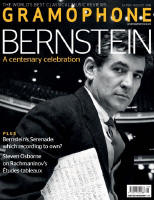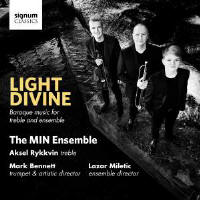Texte paru dans: / Appeared in: |
|
|
Outil de traduction (Très approximatif) |
|
|
Reviewer:
David Vickers This juxtaposition of Handel and Rameau is an interesting proposition because the soloist is the boy treble Askel Rykkvin (whose voice has since changed) and the Norwegian MIN Ensemble bridge the gap between modern- and period-instrument chamber orchestras with a pragmatic compound of both (modern strings, oboes and bassoon but Baroque trumpets, flute, theorbo and harpsichord). Directed by trumpeter Mark Bennett, the disparate mixture of orchestral movements is sequenced engagingly. The first movement of Handel’s Concerto in D (HWV331), a close relation to the Water Music, is played to nonchalant and vibrant effect. Rykkvin and Bennett duet with impeccable poise and judicious trills in the opening section of the Ode for the Birthday of Queen Anne. The gorgeous passacaglia from the Trio Sonata, Op 5 No 5, leads neatly into ‘What passion cannot music raise and quell’ from Song for St Cecilia’s Day; the rhapsodic cello solo is played with whispered intimacy by Gunnar Hauge, and Rykkvin captures the fusion of Dryden’s poetry and Handel’s music. A hunting aria from the Roman cantata Diana cacciatrice is performed with infectious buoyancy. For good measure, before seven Rameau extracts, there is a precise account of a virtuoso battle aria from Albinoni’s Statira (an opera written not for Venice, as the booklet assumes, but for the 1726 Rome carnival). The Ramellian half is dominated by arrangements of orchestral pieces, played charismatically; Rykkvin’s polished technique and confident musical personality yield a lovely account of Télaïre’s lament from Castor et Pollux and there is a delightful pastoral for a young shepherdess from Naïs, in which a pair of modern cors anglais cleverly imitate a musette. |
|




